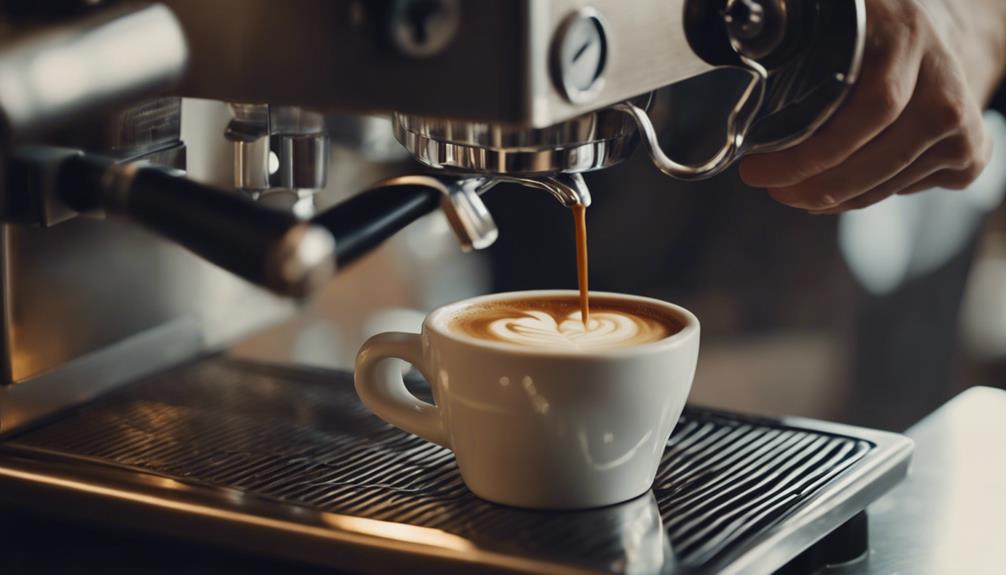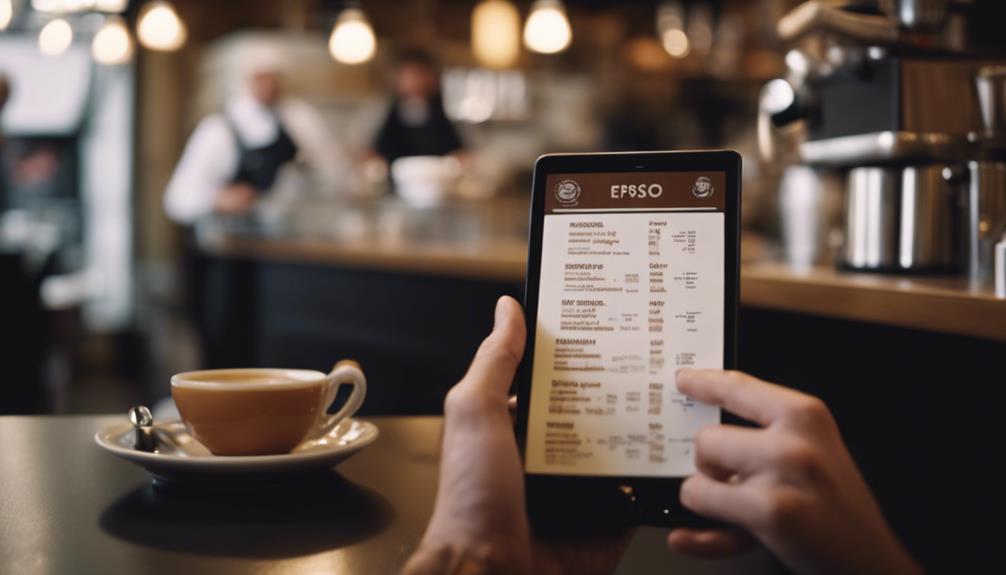When you’re in the mood for a strong and quick espresso, remember to say ‘espresso,’ not ‘expresso.’ The term comes from Italian, meaning ‘quick.’ It’s important for coffee lovers to get it right. Pronounce it as ‘ESpresso,’ not ‘Ex-presso,’ to honor its origins. Baristas often help customers ensure they use the correct terminology. By embracing ‘espresso,’ you show respect for Italian coffee traditions. Avoid the common mistake of mispronouncing it; focus on ‘es’ instead of ‘x.’ Learning the proper term adds an authentic touch to your coffee experience. And there’s much more to explore in the fascinating world of espresso vocabulary.
Key Takeaways
- Pronounce 'Espresso' as 'ESpresso' to emphasize the correct first syllable.
- Avoid saying 'Expresso,' as it is a common misspelling in English.
- Baristas often correct mispronunciations to maintain coffee terminology accuracy.
- Using 'Espresso' respects the Italian origins and coffee culture.
- Attention to correct pronunciation enhances the authenticity of the coffee experience.
Origins of Espresso
With origins rooted in Italy, the creation of Espresso can be credited to Luigi Bezzera of Milan in the early 20th century. Bezzera's invention revolutionized the coffee world by introducing a new way to brew coffee quickly and efficiently. By forcing hot water through finely-ground coffee beans, a shot of espresso is produced, known for its strong and concentrated flavor. The term 'Espresso' itself comes from the Italian word 'espresso,' meaning 'express' or 'quick,' highlighting the rapid preparation method of this beloved coffee beverage.
Luigi Bezzera's innovative espresso-making method marked a significant milestone in Italian coffee culture, where espresso became a staple known for its rich taste and speedy production. The correct pronunciation of 'Espresso' emphasizes the first syllable without the /k/ sound, distinguishing it from the commonly mispronounced term 'Expresso.'
Bezzera's contribution to the world of coffee has left a lasting legacy, shaping the way we enjoy this intense and flavorful brew to this day.
Spelling: Espresso Vs Expresso

When discussing coffee terminology, it's important to differentiate between the correct spelling of 'Espresso' and the commonly mistaken spelling 'Expresso.'
'Espresso' is the accurate term, originating from the Italian word for 'express,' reflecting the quick preparation of this strong coffee.
On the other hand, 'Expresso' is a frequently seen misspelling that has crept into some English usage but is considered essential in the world of coffee connoisseurs.
The term 'espresso' is universally recognized in coffee culture globally, representing a specific brewing method and type of coffee.
Maintaining the proper spelling of 'espresso' is vital for upholding the authenticity and precision of coffee terminology.
Pronunciation: ESpresso, Not Ex-presso

To ensure accuracy and respect for coffee terminology, remember to pronounce the word as 'ESpresso,' not 'Ex-presso.' When ordering your favorite coffee drink, it's important to emphasize the first syllable to convey the correct pronunciation. While 'Ex-presso' is a common mistake in English-speaking countries, baristas often kindly correct customers to maintain the integrity of the term.
By saying 'ESpresso,' you not only adhere to the proper pronunciation but also demonstrate a level of appreciation for the Italian origins of the word. The emphasis on the 'S' sound captures the essence of the term in its true form.
This attention to detail not only shows your understanding of coffee culture but also reflects a desire for precision in language.
Importance of Correct Terminology

Embracing the proper terminology, such as using 'Espresso' over 'Expresso,' is essential in demonstrating respect for the origins and traditions of coffee culture. By using the correct term, you pay homage to the rich Italian cultural heritage that surrounds this beloved drink.
Baristas often verify when customers say 'Expresso' to ensure accuracy in coffee terminology. The pronunciation of 'Espresso' without the /k/ sound reflects the authentic Italian way of saying it, adding a touch of tradition to your coffee order.
While 'Expresso' has gained some recognition, 'Espresso' remains the widely accepted and respected term in the coffee world. Understanding and using 'Espresso' correctly not only adds authenticity but also shows respect for the centuries-old tradition of espresso making.
Italian Influence on Coffee Culture
False
Common Mistakes to Avoid

Correctly pronouncing 'espresso' is important in avoiding a common mistake in coffee terminology. Mispronouncing it as 'expresso' is a prevalent error in English-speaking areas.
The key lies in emphasizing the first syllable 'es' rather than focusing on the 'x' as in 'expresso.' Baristas often make gentle corrections when customers mistakenly order an 'expresso,' highlighting the correct pronunciation as 'espresso.'
Understanding that 'espresso' originates from Italian can aid in saying it accurately. Utilizing the proper term 'espresso' plays a role in upholding precision in coffee jargon.
By being mindful of this distinction and pronouncing 'espresso' correctly, you can navigate around a common linguistic slip-up in the world of coffee. Staying attuned to the Italian influence on coffee culture and embracing authenticity will enhance your overall coffee experience.
Embracing Authentic Espresso Experience

To fully appreciate the rich tradition of espresso-making, make sure you pronounce 'Espresso' correctly without the common error of saying 'Expresso.'
Embracing the authentic Italian espresso experience involves more than just the pronunciation; it reflects a respect for the cultural heritage of this beloved drink. By pronouncing it as ESpresso, you pay homage to its Italian origins and the meticulous craft that goes into making a perfect shot.
Baristas worldwide take notice when customers say 'Espresso' correctly, as it shows an understanding and appreciation for the art of coffee-making. This simple act not only enhances your coffee-drinking experience but also adds a touch of sophistication to your coffee knowledge.
Understanding the nuances of espresso terminology can elevate your enjoyment of this classic beverage and deepen your connection to its rich history. So, next time you order your favorite espresso drink, remember to say it right and savor every sip of the authentic espresso experience.
Frequently Asked Questions
Do French People Say Expresso or Espresso?
In France, the correct pronunciation is 'espresso,' aligning with its Italian roots. French speakers generally avoid saying 'expresso' due to it being deemed incorrect.
The French coffee culture places importance on accurately pronouncing 'espresso.' Baristas in France often correct customers who mistakenly say 'expresso.'
Understanding these linguistic nuances in French is key to appreciating the proper pronunciation of 'espresso' in the country.
Do We Say Espresso or Expresso?
You should say 'Espresso,' not 'Expresso.'
This term, originating from Italy and meaning 'express' in Italian, reflects the quick preparation process of this strong coffee.
Using the correct pronunciation not only shows respect for the drink's cultural heritage but also guarantees clear communication in coffee settings.
Why Do People Mispronounce Espresso?
People often mispronounce 'espresso' as 'expresso' due to the similar sound of 'x' and 's' in English. This mispronunciation has spread widely, causing confusion in coffee culture.
Hearing others use 'expresso' without correction reinforces the mistake. Understanding the correct pronunciation and origins of 'espresso' can help avoid perpetuating this error.
Baristas and coffee enthusiasts often gently correct customers to maintain accuracy in coffee terminology.
Why Do People Confuse Espresso and Expresso?
People often confuse 'Espresso' with 'Expresso' due to the similar sound of 'Express.' The correct term is 'Espresso,' originating from Italian. Despite 'Expresso' appearing in some dictionaries, 'Espresso' is the accurate term in the coffee world.
Imagine ordering a rich shot of 'Espresso' to savor the true flavor, not 'Expresso.' Understanding this distinction helps appreciate the linguistic nuances and cultural significance of the term.
Why is it important to pronounce and spell “espresso” correctly?
Many people often get the spelling and pronunciation differences of “espresso” wrong. It’s important to get it right because mispronouncing or misspelling it can make a negative impression on others, especially in business settings. Plus, using the correct term shows respect for the coffee and the culture it comes from.
Conclusion
Just like how a fine espresso is crafted with precision and care, saying it correctly as 'espresso' adds a touch of elegance and authenticity to your coffee experience.
Remember, it's not just about the coffee itself, but also about the culture and tradition behind it.
So next time you order your favorite drink, make sure to pronounce it right and savor every sip like a true connoisseur.
Cheers to the perfect espresso!









